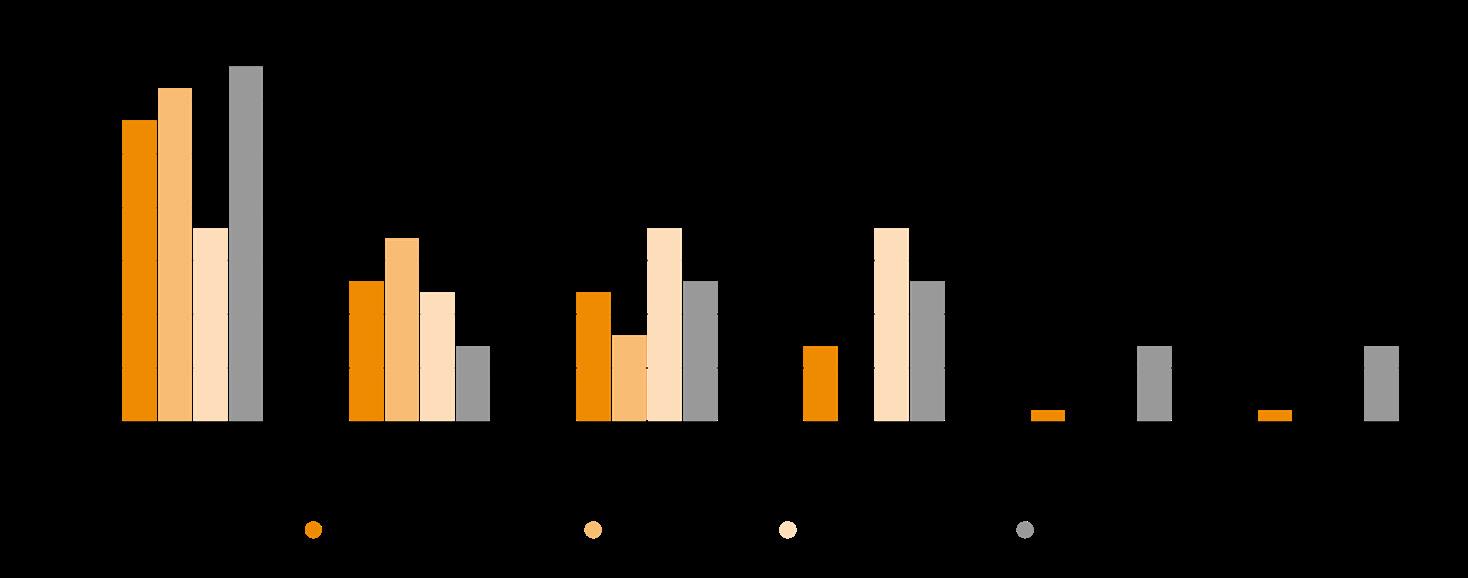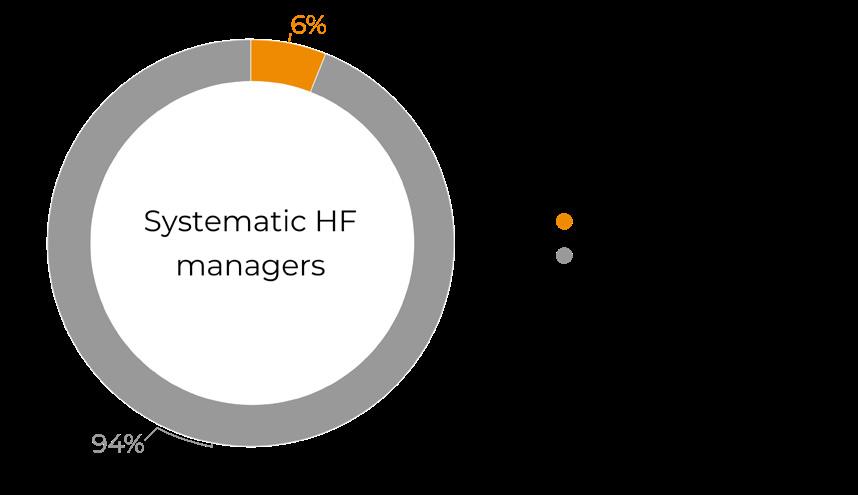
6 minute read
SECTION 2 | TECHNOLOGY
HEDGE FUNDS TAP INTO TECH TALENT
With hedge funds increasingly using alternative data and algorithms to help unearth investment ideas, and cryptocurrencies continuing to garner interest, computer coding, data science and AI expertise are now in high demand across strategies
Tech-based expertise is now a key battleground in hedge fund staffing, expanding far beyond the computer-based quantitative space in recent years, as managers running traditional fundamental and discretionary-focused strategies also look to draw on the alpha-generating opportunities offered by the avalanche of alternative datasets and algorithm processes in the hunt for yield.
From probing credit card data to inform retail stocks’ performances to using satellite imagery of factory traffic to obtain viewpoints on production levels, managers of various strategies are now quantitatively crunching data in order to shape their portfolio positioning, recruiters say.
“A lot of managers dipped their toe in, they hired a few people, and they have incorporated more sophisticated quantitative aspects to their investment process, and as a consequence of the success that they’ve had, they have built upon that by adding more
Data analysis is one aspect of it, but human judgment still remains the core way in which they generate their investment theses
Anthony Keizner, partner, Odyssey Search Partners
Figure 2.1: Hedge fund hiring activity for select current hiring trends

Analyst note: Survey respondents were asked, ‘Is your firm actively seeking talent/expertise in any of the following areas?’ Source: Hedgeweek survey, Q2 2022
people and building it out,” John Hindley, partner, financial services at Heidrick & Struggles, says of the rise of technology. “It continues to be an area where people have added headcount.”
Asked if they are actively seeking talent and expertise in areas such as digital assets, illiquid markets and computer coding/AI, the latter proved to be the most common pick among most managers across AuM sizes (see Fig. 2.1).
Daunting
As a result, the competition for quantitative expertise “has never been more daunting”, according to a recent study published by Barclays.
The report, published in June by its Capital Solutions Group, found that 94% of hedge fund managers now find it more difficult to secure tech talent - with data/ portfolio engineers and quant analysts and researchers proving particularly hard to hire or retain (see Fig. 2.3).
Barclays notes how hedge funds are battling not just with other hedge fund firms, but also multi-manager platforms and technology companies more broadly in a bid to secure talent in this area (see Fig. 2.4)
“While managers acknowledge that the rise of multi-manager platforms has made the war for talent more fierce, roughly 90% of them also indicate that they are not competing with MM platforms exclusively in terms of getting the best talent,” the report observed.
The study also explored the ways in which hedge funds are now looking to source talent, including the use of headhunters, undergraduate and graduate programmes, and overseas connections. It found that although on-campus recruitment remains Figure 2.2: The number of hedge fund hires by department, May 2022 versus July 2022

Source: Vision Hedge Fund Talent Flow Report, August 2022
“relatively rare” amongst hedge funds, 45% of the quant names in its survey do recruit on campus, with a particular focus on PhD programmes.
Flexibility
“If you look at the macro part of our investment team, I’d say 80% of the team has an engineering or computer science background, many at PhD level,” says Dharmesh Maniyar, founder, CEO and CIO of macro-focused fund manager Maniyar Capital and a data scientist by training, noting how the team fuses macro discretionary experience and expertise with data science. “We definitely look at the tech expertise. But every role is different – some roles don’t require any coding. It’s not an absolute requirement, although the ability and appetite to work closely with our technologists in developing our infrastructure is something that we look for across the board.”
He adds: “But if you look at our current investment team, which is almost half of our Figure 2.3: Systematic hedge fund managers assessment of the environment for hiring/attracting talent

Source: March of the Machines report, Prime Services Capital Solutions, June 2022
1 IN 4 HEDGE FUNDS ARE NOW ACTIVELY SEEKING COMPUTER CODING/AI EXPERTISE
firm, many are seasoned coders and we test both quantitative and coding skills as part of our recruitment process. We have both a very experienced discretionary macro trading team and a very strong quant research and quant development team, who can also help out developing the infrastructure in other areas of the business.”
Adrian Fraenkel, founder and CEO of quantitative hedge fund Varuna Technologies, whose business is built around a remote working model with staff spread across different countries, says the firm’s “total flexibility” in working location has proven to be a strong pull for talent.
“Potential employees are able to reside in the jurisdiction of their choice, which they can choose based on cost-of-living considerations – something that is as relevant as it ever has been in our lifetime – or taxation, or any other factor that might influence their decision,” Fraenkel tells Hedgeweek. “We also have a bonus system for the quants we on board, based on the performance of their strategies, which acts as a compelling incentive for those looking to be appropriately rewarded for the strategies they develop.”
Meanwhile, the continued volatility within the cryptocurrency and digital assets markets is also shaping hedge fund hiring trends, according to recruiters.
“At the start of the year we were looking to fill a number of hedge fund opportunities that had arisen because people have been moving to the digital asset space and wanted to do crypto and crypto start-ups,” says John Hindley. “By April that had slowed quite considerably, but it still remains an area of interest.”
As digital assets remain increasingly prevalent in institutional investors’ portfolios despite this year’s seismic shocks, hedge funds running cryptocurrency-focused strategies continue to seek out both sales and investment expertise in this space.
Hindley adds: “You discount digital assets at your peril - it’s one of those things where whatever the situation is today, six months from now it will look completely different.”
Unprecedented
While data and tech expertise and quantitative techniques will remain in demand, they ultimately will not replace the human element
Figure 2.4: Main competition for talent according to systematic hedge fund managers
Source: March of the Machines report, Prime Services Capital Solutions, June 2022 within the hedge fund industry, suggests Anthony Keizner, partner at Odyssey Search Partners.
“There is a view that suggests quant can only go so far. Over time, quant funds I don’t believe have figured out the secret sauce of the way that markets work any better than fundamentally-driven firms have,” Keizner says.
“Currently, we face unprecedented times - bonds are going up at the same time as equities; inflation is rising but still the employment figures are rising too. Things are so complicated that relying on historic datadriven responses is very difficult.
“What they are thinking is that if they can get the smartest minds into their firms, they will be able to adapt and interpret these situations hopefully better than their competitors, and the market at large, and they will get an edge that way. Data analysis is one aspect of it, but human judgment still remains the core way in which they generate their investment theses.”

KEY TAKEAWAYS
• Demand for tech-based talent such as computer coding and AI is rising among quantitative and discretionary hedge funds alike. With the industry leaning further into evolving trends such as alternative data to help strengthen investment themes and generate alpha, certain tech expertise continues to prove hard to hire or retain.
• However, with volatility remaining high, and economic trends continuing to be disrupted, industry participants caution that quant systems and analysis can only go so far in driving performance, with human judgement still key to fostering portfolio ideas.




